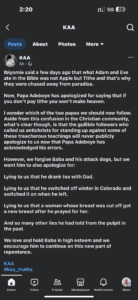In a recent social media post, a Facebook user known as KAA has sparked a heated discussion by demanding an apology from Pastor Enoch Adeboye, the General Overseer of the Redeemed Christian Church of God. This call comes in the wake of conflicting statements made by prominent religious figures, including Pastor David Ibiyeomie, who controversially claimed that what Adam and Eve consumed in the Garden of Eden was not an apple, but rather tithe—an assertion that he believes led to their expulsion from paradise.
The controversy intensified when Pastor Adeboye issued an apology for his previous statement that suggested individuals who do not pay tithes would not enter heaven. This admission has left many followers confused about whom to trust within the Christian community, as differing interpretations and teachings emerge from respected leaders.
KAA expressed frustration over the gullibility of some followers who labeled critics of these teachings as “antichrists,” yet now remain silent in light of Adeboye’s acknowledgment of his own errors. Despite this, KAA emphasized a spirit of forgiveness towards both Adeboye and his supporters, while also urging the pastor to take further responsibility for his past statements.
The Facebook user specifically called for Adeboye to apologize for several controversial claims he has made over the years, including:
1. Drinking Tea with God: KAA challenged the authenticity of Adeboye’s assertion that he has shared tea with the Almighty, questioning the implications of such a statement on the nature of divine interaction.
2. Controlling Weather Patterns: The pastor’s claim that he could “switch off” winter in Colorado and turn it back on at will was also highlighted as a troubling exaggeration that undermines the seriousness of his message.
3. Miraculous Healings: KAA referred to a specific instance where Adeboye allegedly prayed for a woman who had undergone a mastectomy, claiming she received a new breast as a result. This assertion raised eyebrows and calls for scrutiny regarding the authenticity of such miraculous claims.
KAA concluded by reaffirming a sense of respect for Pastor Adeboye, urging him to continue on a path of repentance and accountability. The demand for transparency and honesty within religious leadership resonates with many who seek clarity and integrity in spiritual teachings.
As this conversation unfolds, it highlights the broader issues of trust and accountability in religious communities, prompting followers to reflect on the teachings they embrace and the leaders they choose to follow. The call for an apology serves as a reminder that accountability is essential, even among those held in high esteem.



